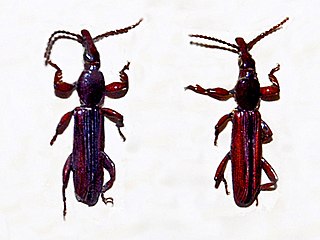
Weevils are beetles belonging to the superfamily Curculionoidea, known for their elongated snouts. They are usually small – less than 6 mm in length – and herbivorous. Approximately 97,000 species of weevils are known. They belong to several families, with most of them in the family Curculionidae. It also includes bark beetles, which while morphologically dissimilar to other weevils in lacking the distinctive snout, is a subfamily of Curculionidae. Some other beetles, although not closely related, bear the name "weevil", such as the biscuit weevil, which belongs to the family Ptinidae.
Caridae is a small Gondwanan family of weevils. They are considered part of the primitive weevil group, because they have straight rather than geniculate (elbowed) antennae. The insertion of the antennae on the rostrum cannot be seen from above. Caridae also lack spiracles on abdominal tergites 6 and 7. The prothorax lacks lateral carinae. It has been suggested that the fossil weevil Eccoptarthrus belongs in this family, which would result in a change in the family name ; this proposal has been rejected by most coleopterists (e.g.)

Brentidae, sometimes known as the primitive weevils, is a cosmopolitan family of primarily xylophagous beetles also known as straight-snouted weevils. The concept of this family has been expanded with the inclusion of three groups formerly placed in the Curculionidae; the subfamilies Apioninae, Cyladinae, and Nanophyinae, as well as the Ithycerinae, previously considered a separate family. They are most diverse in the tropics, but occur throughout the temperate regions of the world. They are among the families of weevils that have non-elbowed antennae, and tend to be elongate and flattened, though there are numerous exceptions.

Ithystenus wallacei is a species of straight-snouted weevils belonging to the family Brentidae.

Ithystenus curvidens is a species of straight-snouted weevils belonging to the family Brentidae.

Ithystenus is a genus of straight-snouted weevils belonging to the family Brentidae. Species of this genus can be found in Papua New Guinea

Eutrachelus temmincki is a species of straight-snouted weevils belonging to the family Brentidae.

Eutrachelus is a genus of straight-snouted weevils belonging to the family Brentidae.

Cerobates tristriatus is a species of beetles belonging to the family Brentidae.
Paratrachelizus uncimanus is a species of primitive weevil in the beetle family Brentidae. It is found in the Caribbean Sea and North America.

Eutrichapion viciae is a species of pear-shaped weevil in the family of beetles known as Brentidae.

Perapion curtirostre is a species of pear-shaped weevil in the family of beetles known as Brentidae.

Stenopterapion meliloti is a species of pear-shaped weevil in the family of beetles known as Brentidae.

Cylas formicarius, the sweet potato weevil, is a species of sweet potato weevil in the beetle family Brentidae. It is found in Africa, Australia, the Caribbean, Europe, Northern Asia, Central America, North America, Oceania, South America, Southern Asia, the Pacific Ocean, and temperate Asia.

Cylas is a genus of sweet potato weevils in the beetle family Brentidae. There are more than 20 described species in Cylas.

Cyladinae is a subfamily of sweet potato weevils in the family of beetles known as Brentidae. There are two genera in Cyladinae, Cylas Latreille 1802, and the extinct genus Miocenocylas Legalov 2018.
Heterobrenthus texanus is a species of primitive weevil in the beetle family Brentidae. It is found in North America.
Heterobrenthus is a genus of primitive weevils in the beetle family Brentidae. There are at least three described species in Heterobrenthus.
Stereodermus exilis is a species of primitive weevil in the beetle family Brentidae. It is found in the Caribbean Sea and North America.
Stereodermus is a genus of primitive weevils in the beetle family Brentidae. There are more than 40 described species in Stereodermus.










